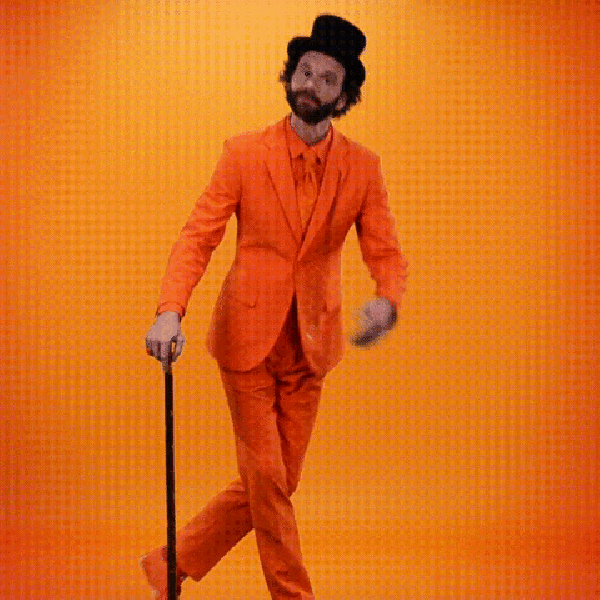Prompt: Which fictional plot do you think can actually become a reality?
2012

I remember watching the movie 2012 when it was first released and partially covering my eyes throughout the entire thing because I couldn’t stomach the graphic scenes of mass destruction. I remember there being conspiracies on social media claiming that 21 December 2012 would be doomsday – end of the world – – the Mayan Calendar, not science, was apparently supposed to be trusted more. But once the date passed and nothing happened, it was as if everyone forgot about that fear. Fast forward to 2019, when actual scientific evidence tells us that we have 17 months to counter the effects of climate change before it is too late, people barely bat an eye. It may seem like humankind is destroying Planet Earth, but we are actually just destroying ourselves. The Earth has completely wiped out all lifeforms before, and it can do so again. It would be plain ignorant to believe we humans can be the exception. Corporations continue profiting off the Earth’s resources, people in power continue to claim the non-existence of climate change despite scientific proof, and plain folks are wishing death on a 16-year-old who took the initiative to make a stand to save the Earth. Despite how far-fetched the idea of total world annihilation may seem, if we do continue on without change, 2012 may very well come true. By then, no one will be spared.
-Jaclyn Heng
Flowers for Algernon by Daniel Keyes
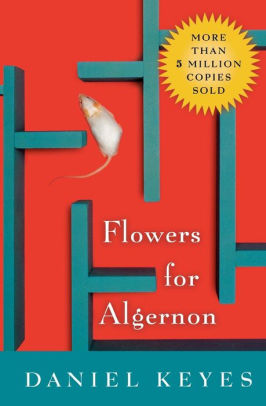
All of us feel a need to be proficient in the things we do. And I think all of us, at one point or another, have felt completely out of our depth. There’s nothing quite like the disappointment when you realize hard work isn’t enough to bridge the chasm between yourself and an ideal. But what if the answer isn’t hard work?
Flowers for Algernon follows the life of an intellectually disabled man, Charlie, who undergoes an experimental procedure that adds an extra 120 points to his IQ. His written reflections documents this increase gradually: his writing becomes more eloquent, he becomes more discerning – and of course – people start treating him better. The trouble with experimental procedures is they don’t always end well – but I won’t spoil it for you.
Now, researchers are investigating cognitive enhancement methods, such as computerized cognitive training, nootropics, Transcranial direct current stimulation (tDCS) and maybe even gene editing. If we reach a point where these methods are guaranteed to be safe and effective, there will be many other ethical questions to consider (e.g. distributive justice and coercion). The book provides no answers, but it’s a great hypothetical that explores our relationship with intelligence.
-Samantha Chang
Minority Report
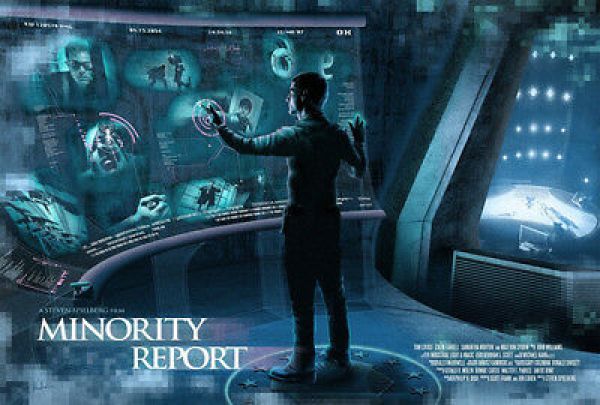
Minority Report for sure. It’s already happening around us. First comes facial recognition for cutesy things like entering the library. But before we know it these scanners will be everywhere, tracking our every move. Information about our entire lives following us through every data port we trigger with our faces. Family, grades, certifications, criminal records. Corporations will track down our movements, what we look at, what makes us smile or frown to tailor their commercials. Entry into certain buildings will be programmed to discriminate. Lip reading technology will ensure no casual conversation is really private.
We will live in a world where no boundaries exist between individuals and the AI monitoring them. Sounds like quite the nightmare but then again, when was the last time you legitimately cared if Facebook was selling your private information or not?
-Fajar
The Hunger Games

Its fitting to predict our future reality based on the discourse we have now. Racial tension is, and always has been, brewing and bubbling over; the superior refusing to ‘relegate’. We start to see each other as less than human. School shootings are common enough for it to pass through the media without inciting more than a sigh. Corrupt politicians are using tactics to placate us, redirecting our attention away from what should matter most.
The Hunger Games’ capitalistic undertones are introduced in its exploitation of ethnic people, and the reluctant acceptance of having children be killed on screen – all dictated by a perverted ideology of entertainment, which is further upheld by a dictator.
We are all too human to promise that this wouldn’t happen.
.
-Anonymous
Black Mirror – San Junipero [ Season 3, Episode 4 ]

Uploading our consciousness to the cloud has always threaded the line between fiction and reality. In San Junipero, this concept is propounded through Kelly and Yorkie, who meet in a simulated reality of a lively city (San Junipero) circa 1980. In the show, there’s more than one simulation, each meant to reproduce a particular era on Earth; from the Bee Gees to Britney Spears. The catch is that these man-made paradise are only accessible to the senile on occassion and for the dead, well, San Junipero is forever.
With the removal of the contemplation of what happens after we die (or more specifically, the impossibility of being engulfed by hellfire), quite the tendentious rumination is introduced: if you knew you could party it up in the afterlife, why stay for the longer, sadder run of reality?
With news of tech start-ups trying to realize immortality by recreating our neurons and their functions, it seems like we’re not too far from living this plot. So far, it certainly seems like computing systems can sufficiently replicate our biological ones, one day. So, hooray?
I’m one of those people who don’t want to live forever, but I’m curious as to how many people would. It seems to me that coming to an acquiescence between the inevitable pro-transfer and anti-transfer groups may be just as hard a feat as realizing the actual transfer of our consciousness.
-Nimue
The Lorax
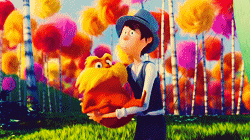
Back in 2012 when I first watched The Lorax with my family, I thought the idea of a world clear of flora was absurd. It can’t be true right? We have 5.5 million kilometres of the Amazon Rainforest itself, the Borneo Rainforest, the Congo Rainforest and the list goes on. However, it’s unsettling to know that this movie is becoming a reality in our very own world right now with corporations excessively cutting down trees for their own riches and with the recent burning of the Amazon forest. It’s truly terrifying to know that soon enough, we’ll have to buy overpriced oxygen tanks from companies because there wouldn’t be enough trees to produce oxygen for all of us.
In fact, this is already a reality in China.
-Asirah
A.I: Artificial Intelligence by Steven Spielberg

A.I is a classic piece of fiction which I believe can become a reality sooner than later. As significant research is being conducted around the world on Artificial Intelligence and many jaw dropping developments are taking place, there is no better time than now to reflect back on the movie to remind ourselves of potential consequences.
The main character, David, is an A.I Robot who is built to love, indicating the state of the world. David goes to a family which is on the verge of losing their son to be accepted as their own and programmed to love the mother. The son recovers and soon enough we see the robot competing for the love of the mother and this drives him to do unethical things. While I don’t want to spoil the rest of the movie, I can assure you that by the end of the film you will quite deeply understand how merging technology and human nature can be both brilliant and disastrous.
The effects are equally about how we, the creators of these machines, will react to them as it is about how our creations will respond to us. For can we humans truly love a machine that is programmed to love us unconditionally? Can we see them as something beyond an object? And the ultimate and frequently asked question – will these machines, some day, surpass us with their access to limitless knowledge, emotional intelligence and unmatchable skills?
-Yumitra Kannan
Psycho-Pass

As we go further and further along the “safety over privacy” path, I can’t help but think of a future not unlike the one presented in Psycho-Pass.
The plot is centered around a system that judges people’s likelihood to commit crimes based on their mental state. A world where stress and negative emotions are avoided at all cost, since you’ll be marked as a latent criminal if you don’t. Never mind that mental illness exists, since people already blame it for every crime under the sun. Never mind that plenty of people who could be criminals never act on them. Never mind that people who take pleasure in hurting others exist.
It’s all for the greater good.
-Anonymous
WALL-E
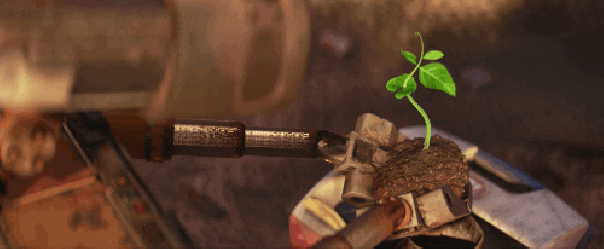
With the ever increasing amount of garbage produced daily, the plot of WALL-E seems to become more of a possibility with every passing year. We burn most of our garbage in incinerators, releasing harmful gases that contribute to global warming and the pollution of lakes and forests. If we don’t become more mindful of how we dispose of our trash, Earth could become uninhabitable just like it did in the movie. WALL-E’s plot should serve as a cautionary tale of what environmental neglect and poor waste management could lead to, now more than ever.
-Nabilah
A.I: Ex Machina by Alex Garland
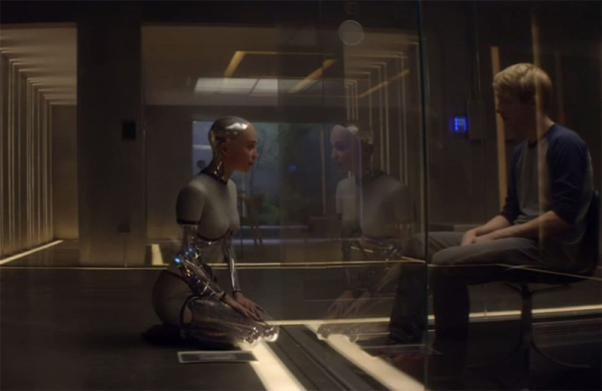
If you’ve ever come across the critically acclaimed movie Ex Machina, you’d know how eerie and mind-blowing their depiction of the classic Artificial Intelligence apocalypse is. The plot focuses on an intern (Caleb) who wins a lottery to test out a company’s AI technology and to see if it was ‘humanlike’ enough. Throughout the series of tests, Caleb gets more and more emotionally invested and ‘connected’ to the robotic lady (Ava) he was testing and [SPOILER ALERT] she ended up outsmarting the entire organization including her creator, then proceeded to escape the lab where she was kept. She then entered the real world where she would be visibly indistinguishable from any other human being despite being fundamentally, ex superior.
The movie shows how data harvesting could be detrimental to the human race especially when AI is put into the equation. Because Ava was an amalgamation of personal databases harvested from Caleb’s personal online profiles, she was able to connect with him on a psychological, intricate level that allowed her to manipulate him and help her escape. Given that data theft and artificial intelligence is only going to advance, there’s no doubt that Ava’s fictional story could be a reality sooner than we think.
-Joyce Chin
With that we welcome you to a series of articles on “Fiction Meets Reality” which will be published on Echo throughout September. Stay tuned!
